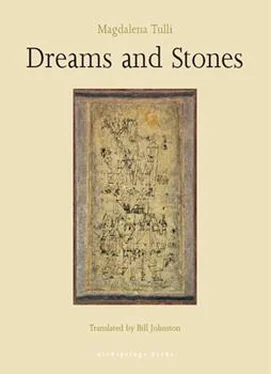Magdalena Tulli - Dreams and Stones
Здесь есть возможность читать онлайн «Magdalena Tulli - Dreams and Stones» весь текст электронной книги совершенно бесплатно (целиком полную версию без сокращений). В некоторых случаях можно слушать аудио, скачать через торрент в формате fb2 и присутствует краткое содержание. Год выпуска: 2004, Издательство: Archipelago Books, Жанр: Современная проза, на английском языке. Описание произведения, (предисловие) а так же отзывы посетителей доступны на портале библиотеки ЛибКат.
- Название:Dreams and Stones
- Автор:
- Издательство:Archipelago Books
- Жанр:
- Год:2004
- ISBN:нет данных
- Рейтинг книги:4 / 5. Голосов: 1
-
Избранное:Добавить в избранное
- Отзывы:
-
Ваша оценка:
- 80
- 1
- 2
- 3
- 4
- 5
Dreams and Stones: краткое содержание, описание и аннотация
Предлагаем к чтению аннотацию, описание, краткое содержание или предисловие (зависит от того, что написал сам автор книги «Dreams and Stones»). Если вы не нашли необходимую информацию о книге — напишите в комментариях, мы постараемся отыскать её.
Dreams and Stones — читать онлайн бесплатно полную книгу (весь текст) целиком
Ниже представлен текст книги, разбитый по страницам. Система сохранения места последней прочитанной страницы, позволяет с удобством читать онлайн бесплатно книгу «Dreams and Stones», без необходимости каждый раз заново искать на чём Вы остановились. Поставьте закладку, и сможете в любой момент перейти на страницу, на которой закончили чтение.
Интервал:
Закладка:
Should the making of adjustments for the fatigue of materials be condemned as a sign of faintheartedness? Can a conciliatory attitude toward their natural tendency to decay and rust be labeled cynicism? Gearwheels wear down and convert ever greater amounts of energy into ever fewer revolutions. They once were new but now are old, used up, for the trash heap. And the cogs of the world also turned more slowly than before, both from the worn gears and because of the defective power source. The skies with their stars and sun revolved more slowly and even the clouds moved less rapidly, drawn sluggishly on invisible strings by a dilapidated motor.
The greediest consumers of energy were the installations that sorted order from chaos, those that separated the city from the countercity. It was these installations that would grind to a halt at every break in the power supply, threatening an emergency of catastrophic proportions. For everything depended on these devices just as a steamship with a leaky hull depends on efficient pumps to keep it afloat on the ocean. It is possible that without them the city would have ceased to exist in an instant, submerged by the turbulent waves of the countercity. Rather let the tramcars stand idle, it was decided, and they stood for hours on end, all in a line, abandoned. For a long time it was still possible to ensure a continuous supply of power to the special mechanisms at the cost of the production lines and the street lights.
It transpired that the greatest resistance to breakdown was presented by clocks and watches, which did not require a constant power source. It was enough for someone to remember to wind them up once a day. But the speed of the hands no longer matched the present time. Each revolution of the minute hand around the dial corresponded with fewer revolutions of the gears or cylinders in the machines. The difference was not great but it was clear and tangible. For instance the lathes which had been the pride of the times of growth and development: As things slowed down, they began to produce many defective parts which made assembly difficult and held up production. The operators of the machines were glad of this. It turned out that the inhabitants of the city preferred resting to working. Each minute contained fewer movements of human hands than previously.
The day’s work was too short for all the labors associated with maintaining order in the world: vacuuming, polishing floors, mending door handles, washing windows. The inhabitants of the city did not have time to eat dinner before sundown. They set aside their spring cleaning till summer was almost over, the leaves were turning yellow and snow was beginning to fall. They turned away from the growing backlog of jobs. What had been neglected always seemed impossible to make up, the vast amounts of work deprived them of hope, and no one wished even to remove their hands from their pockets. They smoked without taking the cigarette out of their mouths and tossed the butts underfoot. In the newspapers they read only the headlines. They took shortcuts by trampling over flowerbeds and made no effort to save electricity. In kitchens beneath washing lines hung with threadbare laundry they scoffed at the naive labor of floor polishing, at marches played on golden trumpets and at lathes, great furnaces and even waiting rooms painted with yellow oil paint. In case of need worn parquet could be replaced with linoleum, a window pane with a sheet of plywood and a broken lampshade with newspaper. No one now looked for the right lampshade or a window pane of the appropriate dimensions, since the inhabitants of the city began to realize that any thing could be replaced with some other thing just as any word could be replaced with another word of the same or — equally well — of the opposite meaning. They no longer cared about things and even less about words; they sought only oblivion.
They defended themselves as best they could from the rapacious city, that immense leech sucking all their strength out of them. They moved slowly like sick people and were sparing in their gestures. Whatever they had to do they wondered whether it might be possible not to bother. It was for this reason that they even jumped out of the way of tramcars too late. Hope, said to be the mother of fools, abandoned the city. In its absence pity also went missing. People laughed at those who were swindled and those who were run over when the light was green. They lorded over the weak and kowtowed to the powerful. They got drunk, seduced women and abandoned them, embezzled money, informed on one other and wept.
No one knew if the perfection of the city was meant to be passed on to its inhabitants or whether on the contrary it was originally hoped that the inhabitants would already be perfect. Those whose lot it was to live there would shout angrily that a person would have to be a saint to even put up with the place. Or they would ask whether frailty was a defect of the race or rather was the consequence of an error in urban planning. They cast doubt on the intentions of those who had created the project. They asked whom the palace had been built for that stood empty at night with its spire reaching up to the clouds. They laughed at the belief that anyone could manage without cupboards and they expressed the suspicion, which quite independently suggested itself, that the creators of the project had a need for even more magnificent interiors and concealed them somewhere as deep as the spire was high.
At kitchen tables, over cups of tea growing cold they conjectured that they were not the ones for whom the city was built. They themselves knew that everything in them was too soft and too fragile, that their will bent too easily while their desires ran first one way and then the other without rhyme or reason. Their hands barely matched the handles of their tools; their hearts were utterly isolated from the rest of the world by a cage of ribs and an integument of skin. There was nothing here for them; all around they found strangeness.
Certain signs — such as the warm tone of voice of radio announcers as they recounted the course of mass celebrations — suggested that hope was still placed in them. That to them, local people, belonged the task of producing that perfect race untrammeled by doubt or fear of emptiness, the race that perhaps the city was waiting for. For them it was certainly not waiting: All those employed in the local factories and offices, recorded in the registration lists and in the ledgers of the registry office, exhausted by their hardships and their lust for comforts, suffered from problems of the stomach, liver and teeth and were tormented by shortness of breath. But despite all this the thought that their women were to give birth to children of another clay, different from their parents, was disagreeable to them.
From other signs — for example, sarcastic comments about the laziness of turners and fitters printed in the broadsheets of factories and pinned to the walls — the inhabitants of the city could conclude that they were an interim species that was to yield to another better than itself, which would appear once the city finally achieved perfection. These unpalatable speculations gave birth to troubling visions of having to move out. No one wanted to take their belongings and their children and leave that unloved place, the only one they had. Humiliated, they fell into an obstinate, angry silence. No one wanted the coming of children of stone or the appearance of new tribes. And everyone was more or less reconciled to what they already had.
There were also those from whom the inhabitants of the city could hear that it had been perfect for some time now — much too good for the drivers, fitters, nurses and bus conductors, cleaning ladies and their mechanic husbands who lived in it. All that riff-raff.
Quite unexpectedly refrigerators and washing machines appeared in the world, some of them broken from the very beginning. And also televisions in whose innards, through a glass screen people gazed in astonishment at a trembling, indistinct, black-and-white world the like of which no one had ever seen before. In the meantime more and more disorder was creeping into their lives. Over the years the city plan grew ever more complicated. The basic pattern of the star was effaced and little remained of the grand symmetry of the project, as if the world lacked the ideal of the mechanical equilibrium that was meant to be conveyed by the orderliness of the architectural treatments. With time the plan of the city included ever more irregular shapes lying across and upon one another in an inappropriate and disturbing way. Certain streets that previously had been broad and straight began to weave around, turning now one way, now the other with no sense of purpose or direction, seeming to forget the whole they were a part of and the angle at which they were supposed to intersect. In the place where a carousel had stood there would suddenly appear a plaza round as a plate, on whose wet asphalt cars would circle day and night. Where flocks of birds had passed through in the fall an overpass would arise which cars drove on one after another, heavy and ungainly, amidst clouds racing across the sky. The jammed viaduct released a spiral of them out of which — bursting through the iron guardrail — one by one they plummeted downward into puddles that shone with rainbowed patches of gasoline.
Читать дальшеИнтервал:
Закладка:
Похожие книги на «Dreams and Stones»
Представляем Вашему вниманию похожие книги на «Dreams and Stones» списком для выбора. Мы отобрали схожую по названию и смыслу литературу в надежде предоставить читателям больше вариантов отыскать новые, интересные, ещё непрочитанные произведения.
Обсуждение, отзывы о книге «Dreams and Stones» и просто собственные мнения читателей. Оставьте ваши комментарии, напишите, что Вы думаете о произведении, его смысле или главных героях. Укажите что конкретно понравилось, а что нет, и почему Вы так считаете.












